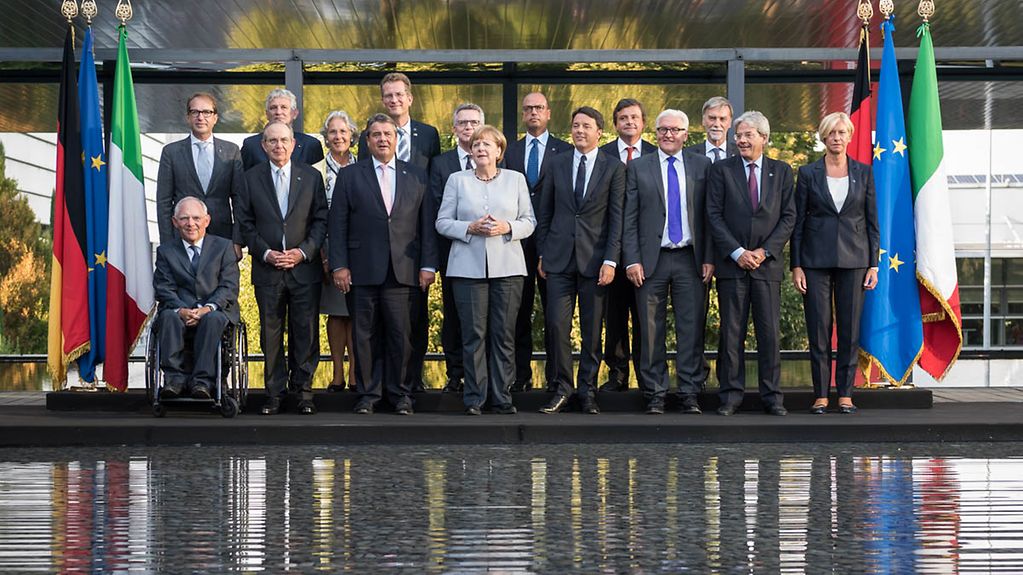German-Italian consultations
Germany and Italy intend to work together to move the European reform agenda forward. A digital single market must be created, said Angela Merkel in Maranello. She also announced that Germany would be contributing to the reconstruction of a school destroyed by the recent severe earthquake in Italy.

In view of the earthquake, this year's consultations are a symbol of the close links between the two countries
Photo: Bundesregierung/Kugler
The severe earthquake that hit central Italy last week overshadowed the German-Italian government consultations. "We feel with you, and I say this not only on behalf of the German government but also on behalf of the people of Germany," stressed the Chancellor on Wednesday in Maranello. She was delighted to have had the opportunity to thank the helpers on the ground; they have worked extremely professionally, she said.
Rebuilding a school
"We would like to finance the reconstruction of a school," announced the Chancellor. This is a contribution of the German government, but also of the German and Italian business community and the German football league. "It was important to us that it is not only governments that help, but that broad sections of civil society are willing to make a contribution."
Pushing ahead with digitalisation
Economic relations between Germany and Italy were another major point on the agenda of the government consultations. Maranello itself is synonymous with Ferrari and Michael Schumacher and with a successful era. Economic successes must be continued, said the Chancellor, and advocated intensive bilateral cooperation between the industrial sectors in both countries.
Angela Merkel pointed out that in both Italy and Germany digitalisation is extremely important for the work of government and for industrial production. "In the reform agenda which is vital for Europe, we will make the creation of a digital single market a focal point," said the Chancellor. She invited Prime Minister Matteo Renzi to a government-level conference on digitalisation that is to be held in Berlin in January.
"Closer cooperation" on migration issues
Migration was another pivotal topic at the government consultations. The Chancellor reported that there was now far closer cooperation with the Italian government on this matter than there had been when Prime Minister Matteo Renzi took office.
Everybody is affected when something serious happens at Europe’s external borders, she said. "That is why I am happy that registration of migrants is now working extremely well in Italy, and that we are working together to return those who have no entitlement to stay in EU states," declared the Chancellor.
Working together on returning unsuccessful asylum-seekers
Germany faces this problem, because not all asylum-seekers are entitled to stay in the country. But in Italy the problem is on a far greater scale because it is dealing primarily with asylum-seekers from African states. "Here it is in the interests of both countries to work with the European Commission to return unsuccessful asylum-seekers, and we will bring this to the European agenda," said Angela Merkel.
Agreements must be concluded with African states. "Because it must be clear that we will meet our humanitarian commitments, but we must also say that who is not entitled to stay, will have to return home." Otherwise we cannot support people fleeing civil war and other refugees.
"I am fully convinced that I was right when I said ‘We can manage it’," said Angela Merkel in Maranello. It was an expression of a certain attitude and a certain motivation. "I believe that we have already achieved a great deal, although a lot of work still lies ahead of us."
Over and above this, Angela Merkel thanked Prime Minister Matteo Renzi for Italy’s support for the EU-Turkey Agreement on refugees. It is important to stop illegal migration, she said. "Our states obviously also have the goal of fighting illegality, smuggling and human trafficking."
The Chancellor was accompanied by Sigmar Gabriel, Federal Minister for Economic Affairs, Frank-Walter Steinmeier, Federal Foreign Minister, Wolfgang Schäuble, Federal Finance Minister, Alexander Dobrindt, Federal Transport Minister and the Parliamentary State Secretary in the Federal Defence Ministry, Ralf Brauskiepe, to this year’s consultations. The last German-Italian government consultations were held in March 2014 in Berlin.